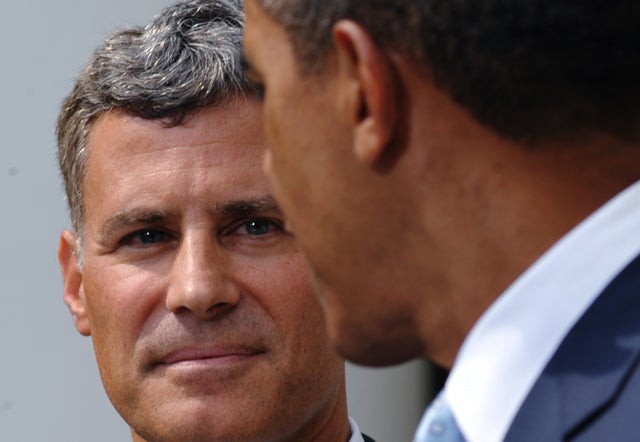President Obama’s pick as chairman of the White House Council on Economic Advisors co-authored a paper that showed that extending unemployment benefits will likely exacerbate joblessness. The paper’s findings run counter to the president’s economic argument for an unemployment benefit extension, which is expected to be a major part of the jobs plan he will unveil early next month.
Princeton University economist Alan Krueger, who will replace Austan Goolsbee as the White House’s chief economic advisor, “is likely to provide a voice inside the administration for more-aggressive government action to bring down unemployment and, particularly, to address long-term joblessness,” according to a report in the Wall Street Journal.
But will Krueger’s recommendations jive with the president’s apparent economic and political agenda? Krueger co-authored a paper for the Handbook of Public Economics in 2002 that seems to undercut the economic argument for extending unemployment benefits. The paper found that those benefits tend to increase the length of unemployment by discouraging the search for a new job, and may actually encourage layoffs. Conversely, the paper also found that unemployed persons who are ineligible for benefits search harder for a job and are therefore unemployed for less time.
The president and his political allies have called for an unemployment benefit extension as a form of economic stimulus. Obama recently claimed that such an extension will “put money in people’s pockets and more customers in stores.” White House Press Secretary Jay Carney claimed that an extension of unemployment benefits could create up to a million jobs.
Liberal economic theory holds that additional government handouts will stimulate consumer demand, create economic activity, and therefore lead to greater employment as businesses take in more revenue. While Krueger did not examine the direct effect of unemployment benefits on economic growth, the 2002 NBER paper did conclude that such benefits do not alleviate, and may very well exacerbate unemployment.
“The empirical work on unemployment insurance (UI) and workers’ compensation (WC) insurance finds that the programs tend to increase the length of time employees spend out of work,” the abstract of Krueger’s paper states. The paper’s examination of others’ work on unemployment benefits finds that “the main labor supply effect of UI is to lengthen unemployment spells.”
The paper also finds that increasing the length of unemployment benefits directly contributes to unemployment. “[I]ncreases in either the level or potential duration of benefits raise the value of being unemployed,” the paper states, “reducing search intensity and increasing the reservation wage.” More generous unemployment benefits, in other words, reduce the incentive to find employment. “Higher and longer duration UI benefits,” the paper adds,” will cause unemployed workers who receive UI to take longer to find a new job.”
On the other hand, workers who are not eligible for unemployment benefits or who have approached or reached the maximum duration of benefits, are more likely to search for, and hence to find work. The study saw an increase in the “escape rate from unemployment for workers who currently do not qualify for benefits and for qualified workers close to when benefits are exhausted.” The study calls this the “entitlement effect.”
Like other entitlements, it is meant as a “social safety net,” not an economic recovery policy. There may be humanitarian reasons to extend unemployment benefits (with corresponding budget offsets), but as a jobs program, by Krueger’s account, the policy will probably fall flat.
Krueger’s paper focuses on economic incentives, and finds –perhaps unsurprisingly – that paying people for being out of work encourages employment in layoff-prone industries, and discourages the search for a new job once a worker is unemployed. It also tends to encourage employees to “work less hard on the current job,” the paper states, due to their knowledge that they will be eligible for unemployment benefits in the event of a layoff.
The moral hazard and skewed incentives of unemployment benefits do not create a healthier economic climate – from the perspective of employment, at least – Krueger’s paper finds. But the president has already signaled both his intention to extend unemployment benefits and his belief that they will, in fact, stimulate the struggling economy.
Will the president heed the findings of his newest chief economic advisor – who, for what it’s worth, supports the liberal political position on other high-profile issues – or stick to a dogmatically liberal approach in the face of Krueger’s own academic work?
